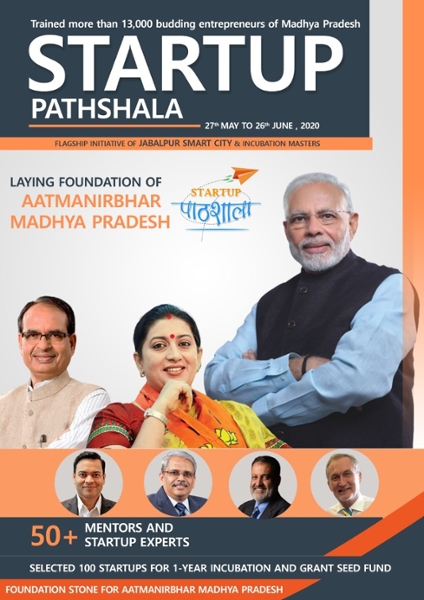Enterprise in the time of Covid

21 March 2021
CLGF's work in India got off to an excellent start this year, with the launch of a Compendium for entrepreneurs in the state of Madhya Pradesh.
One stop compendium for business advice
Through the collaborative efforts of CLGF, working in partnership with the Jabalpur Incubation Centre (JIC) and Jabalpur Smart City, a lot of hard work and effort has gone into helping entrepreneurs with the different aspects of starting a new business, including signposting the help available from different government departments. This has led to a lot of valuable information being amassed but, unhelpfully, scattered across a number of locations. Now, with the new Compendium, any budding entrepreneur need only go to one place to find information about training outcomes, guidelines and best practices, together with details of the various government schemes available to aspiring business owners.
Another indication of the success of the project is that 65% of the business start-ups that have received support from that incubation centres, are now operating independently.
Adapting to help communities with pandemic
Because of the constraints caused by Covid-19 to everyday life, for example, restrictions on travel and physical contact, the nature of CLGF's project work has had to change. The adaptations by the entrepreneurs have not only been innovative and successful, in the business sense, but also extremely helpful to the City's efforts to cope with the pandemic.
Drone technology
Examples of this include using drone technology to spray crops with insecticide. This is more efficient and cost effective than hiring individuals, as a drone can cover a greater land mass in a single day.
Robotics are used to deliver medicines to inside hospital wards, and to dispense sanitiser gel, ensuring social distancing is maintained and reducing the risk of contact.
Other advancements developed at the JIC were the monitoring systems for footfall. As well as counting footfall to help advertisers, during the pandemic the cameras can also see if people are wearing protective masks; and no mask means that doors remain closed and entry is denied.
Sensor system dispensers
In public toilets, to avoid people from having to make direct contact, sanitiser gel is dispensed using sensor systems.
Social entrepreneurship has also benefitted from this project by promoting greater synergy between rural and urban artists. The BIC has been working on allowing artists in rural areas to market their goods on an e-commerce platform. Because there is an agreement that the traditional tribal paintings cannot be copied, the art has been dying out. With the pandemic resulting in many people moving back to the cities, this artform is being revived. Helping to market the paintings has been beneficial to the sellers and the economy in general, but also to reviving an important craft.
Flouishing in adversity
CLGF Regional Programme Manager for India, Ms Anuya Kuwar, said: "It has been very inspiring to see these new businesses flourish, especially in such challenging times. What this demonstrates is that entrepreneurs really need time and nurturing, just as much as funding."
The project - Reducing Poverty through Local Economic Development (LED) in the Commonwealth - is funded by the UK Foreign, Commonwealth and Department Officer (FCDO), the department formerly known as DFID.
Back to News





